Million dollar motor: When an ordinary car is not enough
- Published
The Dartz Prombron has armour plating, bullet-proof windows and exotic leather interiors
What do you buy when an ordinary luxury car is just not good enough? How about a Dartz Prombron?
This monster is built on a Mercedes-Benz chassis. The list of options and features is breathtaking: V8 or V12 six-litre engine, a top speed of 194mph (312km/h), armour-plating, bullet-proof windows, electrified door handles, a choice of exotic leather interiors, dual petrol tanks, signal jammer... the list is almost endless.
The vehicle, which costs at least $1.1m (£730,000; €1m), is the brainchild of Leonard Yankelovich. He was born and grew up in Latvia, when it was still part of the Soviet Union. He trained as an engineer, and made a fortune from customising windows and other car parts in the 1990s.
The Dartz workshop and offices are located on the site of the old Russo-Baltic works in Latvia's capital Riga, where in the past luxury train carriages were made, as well as early models of armoured cars.
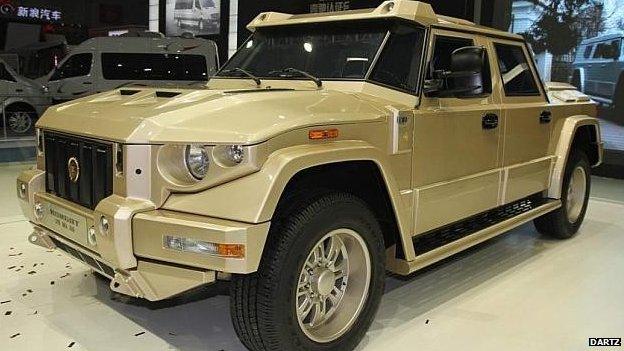
The car's body is armour-plated to enable a driver to make a quick getaway in the event of a shooting
"I am continuing a tradition," says Mr Yankelovich.
After a period of doing increasingly elaborate customisation work, Mr Yankelovich eventually moved into creating vehicles aimed at a new target market - the ultra wealthy.
"Rich people are strange people," he says.
He mentions that he has a client from the UAE who owned a Bugatti sports car, and who then became dissatisfied when his friends also bought Bugattis.
Luxury is too common a word… luxury you can buy in a supermarket. I use the word opulence.
He says it's like "two ladies [who] will hate to come to a party [wearing] the same dress".
Mr Yankelovich says his customers are often driven by a need to own something exclusive. Essentially they want something that other people cannot have, and that has been made especially for them.
In order to serve this market, he says he has to go beyond ordinary luxury.
"Luxury is too common a word… luxury you can buy in a supermarket," he says. "I use the word opulence."
One way to achieve this is through attention to detail. For example, buttons in the car are often gold-plated or made from titanium rather than plastic.
For Mr Yankelovich the aim is to commemorate the glories of the past when, in items made for Russian tsars, sometimes parts like screws would be engraved with the owner's name. Though unseen, the owner would know they were there.
"That's opulence," he says.
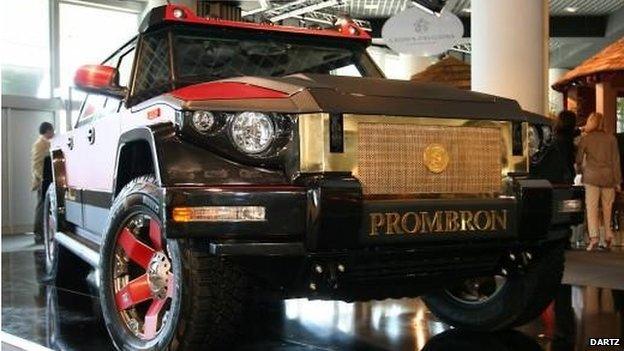
The Prombron is believed to be the world's most expensive SUV
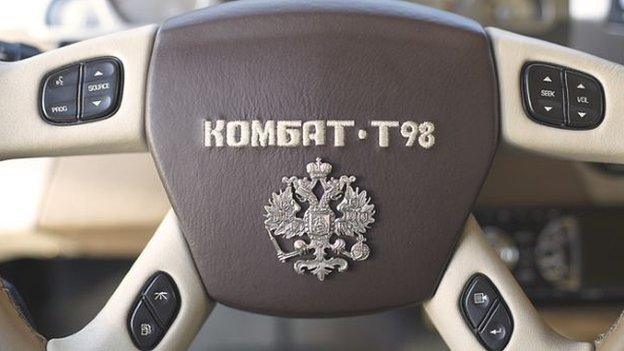
All the car's internal features, such as the steering wheel, are finished with a high level of detail
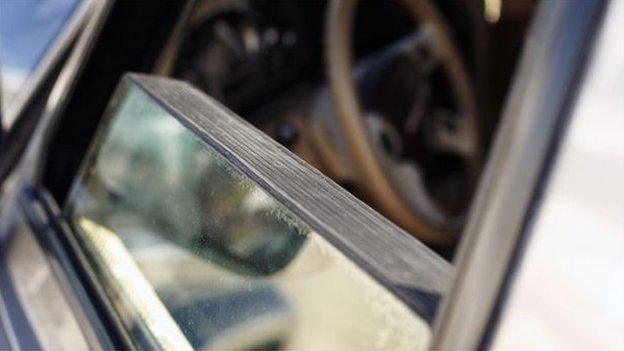
The car windows are extra thick to protect passengers from any kind of attack
But trying to achieve this goal has sometimes caused him trouble. Amongst the exotic coverings that could be used to finish the car's interior he once suggested that whale penis leather could be an option.
A storm of protests followed, including objections from the actress Pamela Anderson. Mr Yankelovich backed down, although Dartz still offers a wide range of other leather finishes, including crocodile.
Another key selling point for the vehicle is protection. Armour-plating is built into the body of the car, rather than being bolted on afterwards and even the bonnet is armoured.
Mr Yankelovich says this is sometimes overlooked but is very important. If the bonnet is not protected, an attacker might be able to shoot at the engine and disable the vehicle, and then would be free to attack the car and its occupants at leisure.
The aim, he says, is not to build a tank, but to enable the car to get away as quickly as possible if a shot is fired - so there is no time for a second shot.
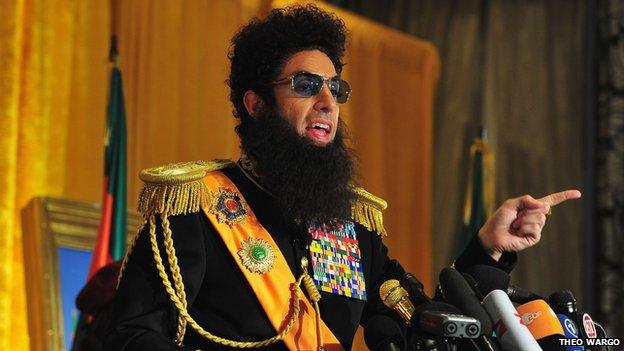
A Dartz car featured in the Sacha Baron Cohen film The Dictator
It may be this aspect that has attracted the interests of Hollywood filmmakers. Dartz cars have featured in several movies, including The Dictator.
A Dartz vehicle does not come cheap. Mr Yankelovich is coy about the exact price, partly because each model is individually made, and the huge range of options mean that final prices will vary a lot. However, he indicates that a vehicle is unlikely to cost less than a million euros.
Mr Yankelovich says he has had some success with his business, with sales to customers in several parts of the world. The biggest challenge though is to find more customers and grow the business further.
But does Dartz's approach provide the basis for a viable long-term business model?



Peter York has advised many luxury companies. He says that it is possible for companies like Dartz to thrive - but the niche is not a big one.
"This is dominated by the need not only to be special but also to present a fantastically aggressive front to the world," says Mr York. "Either you really do live in a city where people are shooting at you all the time, or you've got a very serious case of paranoia."
He adds that it's probably not the fastest way to become a billionaire: "If you did 50 units a year at around £1m, you're turning over £50m - that's not a big business."
But for Mr Yankelovich, his enterprise is about much more than making money.
"I'm doing what I like to do," he says. "When you're making money from the thing you are dreaming about, from your hobby, it's an excellent business."